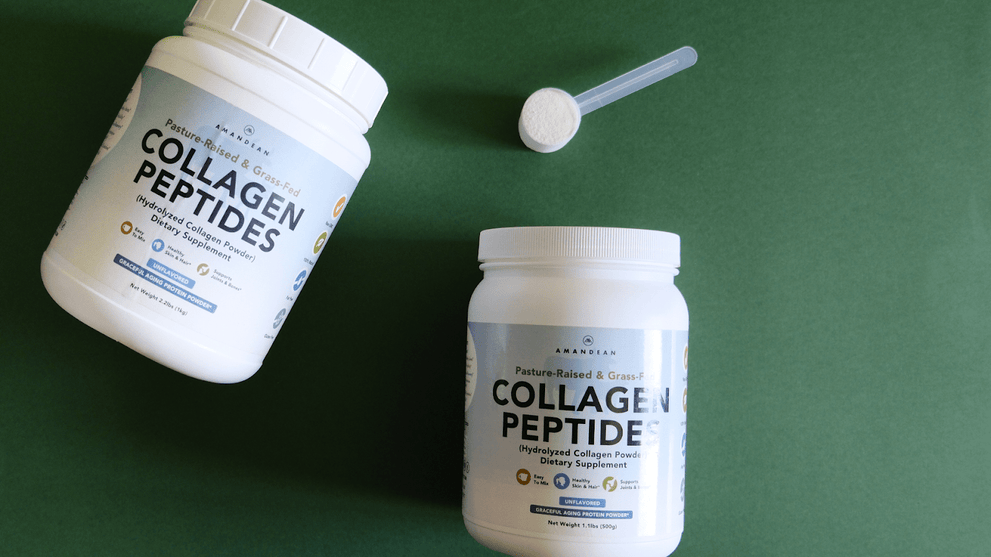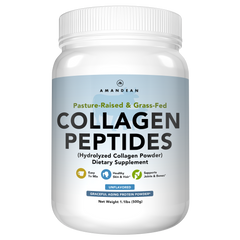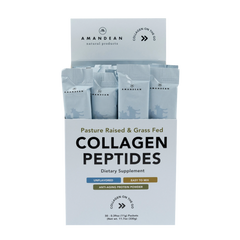Your Cart is Empty


How Much Collagen Should You Take Each Day For Visible Results?
Andjela Rupic
Key Takeaways:
- Recommended Daily Intake: Most research supports a daily collagen intake of 2.5 to 15 grams.¹
- Personal Factors Matter: Your age, activity level, diet, wellness goals, and any specific health concerns all play a role in determining how much collagen you may benefit from.
- Timeline For Results: With consistent daily use, visible improvements in skin elasticity and joint comfort are often reported within 4 to 12 weeks of starting collagen supplementation.¹,⁴
If you’re wondering how much collagen per day is enough to see results, the answer is here. With so many products on the market (and even more advice flying around online), figuring out the perfect dose can feel like a guessing game. But when it comes to collagen, the numbers matter – and consistency matters even more.
At Amandean, we believe that your wellness routine should be effective and easy to stick with. Our premium collagen supplements are expertly formulated for optimal bioavailability, helping your body absorb and put them to good use.* Whether your goal is to support skin elasticity, joint health, or overall vitality, understanding your ideal daily dose is the first step toward seeing meaningful results.*
In this article, we’ll walk through the research-backed sweet spot for collagen intake, key factors that may influence your needs, and how to make your daily scoop count.
Understanding Collagen And Its Role In The Body
Let’s zoom in on collagen – a vital protein that acts like the scaffolding of your body, providing structure and strength to your skin, joints, and connective tissues. So, where does collagen hang out? It’s everywhere: in your skin, bones, tendons, ligaments, cartilage, and blood vessels.¹⁻² It’s responsible for keeping your skin firm, your joints cushioned, and your connective tissues resilient.¹⁻²
Types Of Collagen And Their Locations
This mighty protein plays different roles depending on its type:
- Type I: Found in skin, bones, tendons, and ligaments – this one’s key for structural strength and visible skin benefits.¹⁻²
- Type II: Primarily supports cartilage and joint health.²
- Type III: Often found alongside Type I, contributing to skin elasticity and vascular health.²
Your body is naturally wired to produce collagen, especially in your younger years. But by your mid-to-late 20s, that production begins to decline, dropping by about 1% per year after the age of 30.¹⁻² Factors like aging, genetics, sun exposure, air pollution, and even strenuous physical activity can further reduce collagen synthesis or accelerate its breakdown.¹
Why Collagen Supplementation May Help
As collagen production slows, you may begin to notice visible or physical signs – think less skin elasticity, more joint discomfort, or nails that chip easily. While collagen is constantly being turned over in the body, that natural renewal process becomes less efficient over time.¹ But don’t despair! Supplementing with hydrolyzed collagen peptides, like those found in Amandean’s sustainably sourced marine and grass-fed bovine formulas, may help support your body’s collagen needs from the inside out.* Because they’re broken down into smaller peptides, hydrolyzed collagen is easier to absorb and may be more readily used by the body to support skin, joint, and connective tissue health.¹*
Overall, understanding how collagen works can give you a jumpstart toward upping your cosmetic and joint wellness game. The key is figuring out how much your body needs to keep looking and feeling its best.* Let’s dig into that next.
Recommended Daily Collagen Intake For Visible Results
So, you're ready to jump on the collagen train. Great choice! But let’s get to the question rattling around in everyone’s brain: How much collagen per day will give your skin and joints something to brag about? Here are some evidence-backed ranges to help you dial in your dose:
Finding Your Daily Dose
Most clinical studies support a daily collagen intake between 2.5 and 15 grams, depending on your goals and lifestyle factors.¹
- For Skin Support: 5 to 10 grams daily is considered the sweet spot if you're aiming for improved skin hydration or elasticity.¹
- For Joint And Bone Support: Particularly if you’re active, aging, or recovering from physical stress, studies suggest going up to 10 to 15 grams daily may offer additional benefits.¹
This range is based on results from multiple double-blind, placebo-controlled trials that observed improvements in skin and musculoskeletal health using hydrolyzed collagen peptides over 8 to 24 weeks.¹
Give It Time: When Results May Appear
Like any supplement, collagen isn’t a “magic overnight” kind of deal. Visible changes in skin or joint comfort may take 4 to 12 weeks of consistent, daily intake.¹,³ The crucial word here is consistent. If you skip days or switch between products, you’re less likely to see those cumulative results.
The Scoop On Timing And Absorption
There’s no rigid rule about when to take collagen, but pairing your scoop with a source of vitamin C, which may be found in citrus, berries, or leafy greens, is a dream team pairing. Why? Because vitamin C plays a key role in collagen synthesis, it acts as a cofactor in forming strong, stable collagen fibers.⁵ In fact, research shows that vitamin C may help trigger the formation of new collagen and elastic microfibrils while contributing to a thicker, more resilient epidermis.⁵
If you’re supplementing with vitamin C, try using a liquid liposomal formula, which has superior bioavailability over other forms.
For your convenience, our premium collagen powders are unflavored, easy to mix, and don’t clump up (even in cold drinks!). So, whether you’re team morning coffee, post-workout smoothie, or evening tea, you have both flexibility and science on your side.
Don’t Overdo It
More isn’t necessarily better. While studies haven’t shown harmful effects from higher collagen intake, staying within the 5g to 15g daily range is generally the sweet spot for visible results.¹ It’s about consistency and quality, not megadosing. The good news? Amandean makes it easy. Each collagen scoop delivers 10 grams, and our single-serve stick packs contain 11 grams – so you don’t have to measure or guess your way to daily benefits. Just stir, sip, and let your routine do the rest.
Factors That Influence How Much Collagen You Need
Finding your ideal daily collagen intake isn’t a one-size-fits-all situation. From lifestyle to long-term goals, your collagen needs can be as personal as your coffee order. Here’s what plays into how much collagen per day might be right for you:
- Age: As we age, our natural collagen production begins to decline.² This gradual dip is part of the aging process and may influence how much supplemental collagen your body benefits from.¹⁻² The older we get, the more support our skin, joints, and connective tissues may require.¹⁻²
- Activity Level: If you’re consistently active – whether it’s through strength training, long-distance running, or barre classes – your body may benefit from additional collagen to help support muscle recovery and joint health.¹* Physical stress, especially high-impact or repetitive motion, increases your body’s demand for structural proteins.¹
- Beauty And Wellness Goals: Are you prioritizing skin hydration and elasticity? Or are your goals more performance- or recovery-focused? While 5g to 10g per day is often enough for beauty benefits, joint and muscle support may call for 10g to 15g daily.¹* Defining your goals can help you personalize your dosage.
- Diet And Lifestyle: Your diet significantly affects how well your body utilizes collagen. Collagen synthesis depends on specific nutrients like zinc (e.g., shellfish, legumes, meats, nuts, seeds) and vitamin C (e.g., citrus fruits, berries, leafy greens, bell peppers).⁴ A well-rounded diet rich in these nutrients could help optimize absorption.⁴ On the flip side, smoking, high stress, and excessive sun exposure can accelerate collagen breakdown.¹,⁴
- Collagen Type: The source of your collagen can shape how your body responds. Bovine collagen primarily offers Type I and Type III collagen, which may help support skin elasticity, bone strength, and gut health.*Marine collagen, also rich in Type I and Type III collagen, is known for its smaller peptide size and potential to support more targeted beauty benefits like skin hydration, hair strength, and nail growth.* Choosing the right type depends on your goals, dietary preferences, and how your body feels when you use it.
- Health Conditions: Certain health conditions, life stages, or recovery phases may increase your body’s need for collagen. If you’re navigating injury recovery, digestive issues, or age-related musculoskeletal concerns, it’s best to consult your healthcare provider to fine-tune your intake based on individual needs.
Knowing your lifestyle, goals, and the quirks of your own biology can help you land on your just-right daily collagen target.
Final Thoughts
So, how much collagen per day gets results you can feel good about? Most people do well with 5 to 15 grams daily, depending on their goals, age, and lifestyle.¹ The key is consistency. Collagen works best when taken daily and supported by healthy habits like sleep, hydration, and vitamin C-rich foods.¹,⁴⁻⁵
With Amandean’s premium collagen peptides, you get responsibly sourced collagen that seamlessly mixes into your routine. Our bovine collagen comes from grass-fed cattle in Brazil, while our marine collagen is derived from wild-caught whitefish (cod, pollock, haddock, hake) sustainably sourced from the cold waters off Iceland. We go far and wide to find only the finest ingredients for you. You won’t find flavor fads, artificial sweeteners, or other additives here! Just pure collagen that supports your body with bioavailable ingredients designed to help you feel your best from the inside out.*
Ready to make your glow-up official? Start your collagen journey with Amandean, and treat your body to ingredients that are as pure as nature intended them to be. After all, superhumans deserve super ingredients. When you nourish your body well, it shows — inside and out.
Read also:
- Creatine & Collagen: Why You Need This Powerful Duo
- Powerful Trio For Graceful Aging: Vitamin D3+K2 & Omega-3
- Collagen And Liposomal Vitamin C - A Match Made In Heaven
Frequently Asked Questions About How Much Collagen Per Day
Should collagen be taken with food or on an empty stomach?
Collagen supplementation is flexible. Some prefer taking it on an empty stomach to potentially support absorption, but the science isn’t definitive. What is clear? Consistency matters most. Whether blended into your morning smoothie, stirred into coffee, or added to your favorite snack, collagen works best when you make it part of your daily ritual.
Does the form of collagen (powder, capsule, liquid) affect how much should be taken?
The benefits of collagen depend on the amount you take, not the form it’s in. However, serving sizes vary across powders, capsules, and liquids. Many capsules offer too little collagen or require taking lots of pills daily, while liquids often include unnecessary flavorings, additives, and ingredients. Amandean’s unflavored collagen powders make it simple, delivering a full 10g dose in one scoop or 11g in a stick packet – no extras, no hassle. Exchange your money for Amandean’s collagen powder for an easy, pure dose.
Is it safe to take collagen during pregnancy or breastfeeding?
Collagen supplements – especially pure, additive-free ones like Amandean’s – are generally well-tolerated. But during pregnancy or nursing, it’s always best to consult your healthcare provider before adding any new supplement to your routine. Your doctor can advise you about what’s best for you and your growing baby.
Are there vegan sources of collagen supplements?
True collagen only comes from animal sources, and Amandean’s peptides are derived from grass-fed cattle or wild-caught whitefish. Some plant-based formulas on the market are labeled “collagen builders,” but don’t be fooled. They usually contain nutrients like vitamin C, silica, or amino acids that may support your body’s natural collagen production, but they’re not true collagen.
Is there an optimal time of day to take collagen for best results?
No strict rules here – just good habits. Take your collagen whenever it fits best into your day. Some prefer it in the morning for ease, others in the evening as part of a wind-down routine. Want a bonus? Pair your collagen with a vitamin C-rich food, drink, or supplement, which may help support your body’s natural collagen synthesis.⁴⁻⁵
Can lifestyle factors like smoking or sun exposure affect how much collagen one should take?
Absolutely! Lifestyle plays a significant role. Smoking, excess UV exposure, stress, and poor diet accelerate collagen breakdown.¹,⁴ While there’s no perfect dosage for offsetting these factors, staying within the 5–15g daily range is a good starting point – especially if your skin or joints could use a bit extra TLC.*
Sources:
- Schunck, M., Zague, V., Oesser, S., & Proksch, E. (2023). Oral intake of specific bioactive collagen peptides reduces skin wrinkles and improves elasticity and joint health: A double-blind, placebo-controlled clinical trial. Nutrients, 15(8), 1803. https://pubmed.ncbi.nlm.nih.gov/37064452/
- Sibilla, S., Godfrey, M., Brewer, S., Budh-Raja, A., & Genovese, L. (2015). An overview of the beneficial effects of hydrolysed collagen as a nutraceutical on skin properties: Scientific background and clinical studies. The Open Nutraceuticals Journal, 8, 29–42. https://doi.org/10.2174/1876396001508010029
- Proksch, E., Segger, D., Degwert, J., Schunck, M., Zague, V., & Oesser, S. (2014). Oral supplementation of specific collagen peptides has beneficial effects on human skin physiology: A double-blind, placebo-controlled study. Skin Pharmacology and Physiology, 27(1), 47–55. https://doi.org/10.1159/000351376
- Harvard T.H. Chan School of Public Health. (n.d.). Collagen. The Nutrition Source. Retrieved June 4, 2025, from https://nutritionsource.hsph.harvard.edu/collagen/
- Pu, S. Y., Huang, Y. L., Pu, C. M., Kang, Y. N., Hoang, K. D., Chen, K. H., & Chen, C. (2023). Effects of oral collagen for skin anti-aging: A systematic review and meta-analysis. Nutrients, 15(9), 2080. https://doi.org/10.3390/nu15092080
Join our mailing list.
Sign up to be the first to know about our can't-miss product drops, special VIP offers & exclusive discounts, and upcoming holiday promotions.
Collagen Peptides Powder, 500g - Grass-Fed, Type I & III
Collagen peptides powder, sourced from grass-fed cows, may help maintain skin elasticity and may support...
$29.95
Shop NowCollagen Peptides 30 Individual Packets
Premium Pasture-Raised, Grass-Fed Collagen Peptides. 30 Individual Serving Packets to take with you On-The-Go.
$38.95
Shop Now




